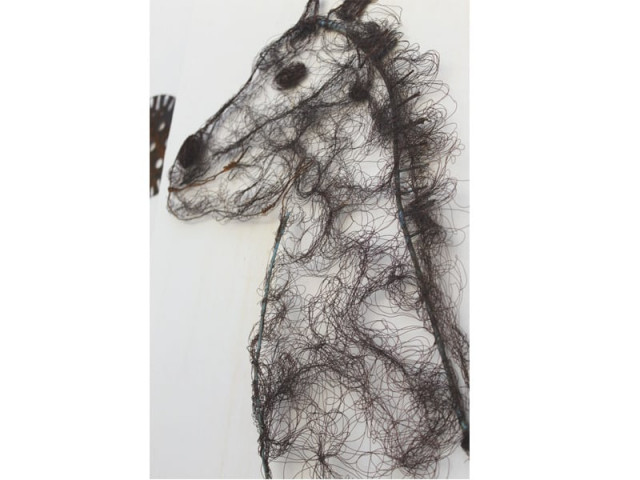Criminal application: Jailbirds may be behind bars, but art sets them free
Karachi’s inmates use art to express loneliness and question the true meaning of life.

Criminal application: Jailbirds may be behind bars, but art sets them free
Why is art important? As Sikandar Jogi says, it can turn a hardened criminal into an artist.
After teaching art to prison inmates at Central Jail Karachi since 2007, Jogi says that he never thought he’d still be here. “I was fresh out of art school when I found out about this job,” he said. “It really scared me - here I was enjoying my student life one second and then going to teach art in a jail! It was surreal.”
His first day at the job was not what he had imagined. He claims that he was nervous since most of the students had a criminal record and were much older than him. “A student recited a verse by Faiz Ahmed Faiz and it broke the ice, it became much easier to communicate,” he recalled. “Initially I had thought it would be difficult to teach them but they were mature and understood poetry quite well, so I just took off from there.”
Now Jogi loves his job. It gives him the joy of seeing people change and tap into their creativity everyday twice a day. And since 2008, he has worked day and night to showcase art created by his talented students.
On Saturday, Jogi and Dhaaba Discussions, an art movement, organised a special show at Central Jail. From the outside, the yellow stone structure looked formidable, but inside it was different. Jogi and his students had managed to transform a correctional facility to look like home.
A tall man wearing a blue shalwar kameez raked through his hair with calloused fingers and stood in a corner of the room, watching and waiting for someone to come up to him and talk about art. As the School of Fine Arts at the central jail started to fill up, he squared his shoulders and stepped closer to his artwork. His face relaxed as he started to talk about the series of oil paintings on display.
“The barren tree in this painting represents my loneliness and loss,” said Moosa, pointing towards a tree next to a lush green field. “Everyone is happy but me.” He added that the two years he spent in prison had really changed the way he thought about life. One of his oil paintings was about people cheering a wolf on stage.
“There is an animal in all of us, one more vicious than the other,” he said. “The wolf represents politicians and government officials who pretend to be something they are not.” Moosa is currently under trial and hopes to be released soon. He did not want to disclose why he was in jail.
Shujaat Ali, another prisoner, was very excited to talk about his work. “I like to experiment with different colours and take inspiration from the beautiful flowers around me,” he said. “In this painting, the pink flower in the middle represents what I used to be.” He added that he had no idea what the future held but that he did not want to be so far away from family and friends. So far he has only spent four years of his 26-year sentence in jail.
A thin man dressed in a cotton shirt and trousers walked around nervously. According to Ali, this man, Fazal Rahim, was under trial for a kidnapping case and had spent two years in prison. “My work focuses on the stage between life and death where a man can atone for his sins,” he said standing in front of an oil painting in shades of blue with blurry figures. “These are the dead people stuck in purgatory. They are being forced to face what they did in their life. How many of us have the courage to do that?” People need to appreciate that all prisoners are not criminals, he remarked.
Syed Jawad Ali Shirazi, who is also currently under trial, said that he liked to talk about issues that plagued society. “I grew up in a village in Sindh and saw how women were treated. Karo kari is something that just stuck with me,” he said. “In my painting, I have tried to show how men don’t respect women and can kill them easily.”
The real star of the show was a man dressed in blue jeans and a red tshirt, Ghulam Mustafa. As he spent six years in prison, the art school became his personal sanctuary. From collages to sculptures and oil paintings, Mustafa likes to create art out of everything. One of his personal favourites is the collage he made on how western imperialism and politics was creating unrest in the country. He will be in jail for another 20 years for selling drugs.
“Sometimes I am amazed when I see their work,” said Jogi. “These people used to kill others and make them bleed and now they sit and contemplate the meaning of life and try to incorporate it in their work.”
Published in The Express Tribune, November 13th, 2011.



















COMMENTS
Comments are moderated and generally will be posted if they are on-topic and not abusive.
For more information, please see our Comments FAQ